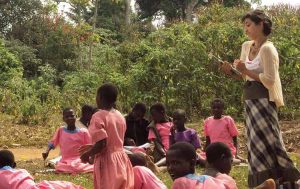Meet BA 07′ Greg Eidsness: His first step to success was Arts Co-op
Greg Eidsness, BA 2007: Political Science In terms of helping him to find satisfying work experiences, Greg Eidsness calls UBC Arts Co-op a “game-changer.” A 2007 Political Science alumnus, Greg currently works in international trade. And yet, not content with just a day job, he and a fellow Co-op graduate, Jason Carroll, have also created […]
Meet BA ’05 Julia Harrison: Becoming part of NATO – check!
Were you one of the proud Vancouverites who rose to their feet at GM place waving your Vancouver 2010 towels with joy when you found out our city won the Olympic bid? That victory was not only exciting for the whole country but it was also a huge moment for one of our own UBC Arts […]
Meet Mark Phelps: Arts Co-op was his best decision at UBC
Mark Phelps, a recent UBC graduate with a BA in Political Science and Economics, recently finished his final Co-op position with the Department of Foreign Affairs and International Trade (DFAIT) focused on raising Canada’s investment profile during the Winter Games. Mark’s academic background in political science and economics prepared him well for his Co-op terms. […]
Meet Tina Wang: A taste of real life
By Stephen Satterfield Ting Wang, Visual Arts major, readily admits she doesn’t have a specific career plan. UBC Arts Co-op led her to communications-related jobs, a field she now finds interesting and rewarding. A student in the visual arts, Ting found that her design skills were a great asset to her resume. Many employers are […]
Meet Jeffery Cui: Doing Arts Co-op Olympic style
By Julia Palmiano Jeffrey Cui, BA 2011: Major Political Science, Minor International Relations When the world’s eyes were set on Vancouver, British Columbia for the Vancouver 2010 Olympic and Paralympic Winter Games, Arts Co-op student Jeffrey Cui was in the thick of it all, working through a Co-op term with Olympic sponsor Jet Set Sports. […]
Meet Helen Bell: Looking to the past
Helen Bell came to UBC to pursue a bachelor’s degree, but will be walking away with much more than a piece of paper: learning to conduct research has opened the door to a wealth of knowledge — and her own identity. “The research component at this institution is excellent,” says Bell. “The respect, integrity and recognition of the uniqueness of First Nations people has really stood out for me. It’s crucial for me that we’re doing research for and with First Nations people, not studying them like specimens under a [magnifying] glass.”
Meet Jessica McIntyre: Lights, camera, beaver meat!
Jessica McIntyre is a student who completed a summer co-op placement with the Aboriginal Peoples Television Network (APTN) which took her to the Northwest Territories. McIntyre, a member of the Northwest B.C. coast Musgamaug Tsawataineuk First Nation, is one of a growing number of students at UBC choosing to extend their studies by a year for the chance to gain valuable work experience through co-op placements.
Arts Insights: How can Arts Co-op help your career?
By Stephen Satterfield “Doing a Co-op degree was the smartest choice I made at UBC!” said Phil Casey, BA 2010 Major Geography, Minor Visual Arts. Two of Phil’s former Co-op employers have made unofficial offers to have Phil return to them post-graduation, and he’s accepted one of them. Phil’s first work term was with Rescan […]
Meet Erica Baker: A passion to serve and perspective to succeed
Entering UBC in the BFA program, Erica Baker was set on visual arts. It wasn’t until she took first-year classes in Political Science and Women and Gender Studies that she began to reroute her academic journey. Erica discovered the First Nations Studies Program, which allows her to take an array of social sciences courses and learn about BC history. “Majoring in First Nation Studies and minoring in Visual Arts is a great way to balance two things I love,” said Erica.
Learning by Doing: Arts Students Travel to Uganda
For twelve students this summer, the classroom is going global. When course work meets citizenship, the result is Sociology 435. The course integrates regular classroom-based teaching with experiential learning, connecting theoretical knowledge to everyday practices and encouraging students to be responsible citizens globally and locally.


